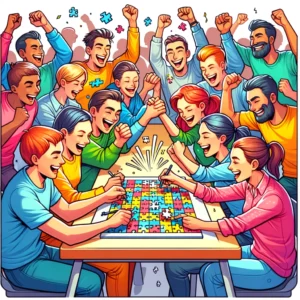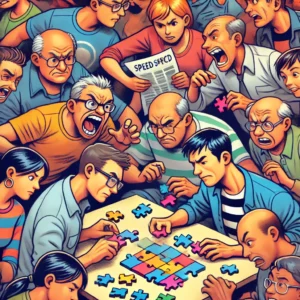
Speed puzzling is a high-energy, fast-paced challenge where every second counts. Whether you’re competing in a jigsaw puzzle tournament or racing against personal bests at home, efficiency is key. But even the fastest puzzle players can fall into common traps that actually slow them down – often without realizing it.
Speed Puzzling Fails: You Lose Your Best Time
If you want to go faster, improve your skills, and win more puzzle competitions, it’s time to recognize and fix these common speed puzzling pitfalls. Here’s what might be hurting your time – and how to change it.
Table of Contents
1. Sitting Down to Speed Puzzle (When You Should Be Standing!)
One of the biggest mistakes speed puzzlers make is sitting down too soon. While puzzling at home might be a casual, sit-down activity, in a competitive setting, standing gives you a huge advantage.
- Standing gives you a better view of the entire puzzle: allowing you to scan for missing pieces faster.
- You can move more freely: quickly shifting positions without the restriction of a chair.
- You stay more engaged and active: preventing the sluggish feeling that can come from being seated for too long.
Quick Fix: Stay on your feet as much as possible – especially in the beginning when sorting and placing the border. If you sit, be ready to jump up for quick scans, but also know it blocks some of your view of the table.
2. Not Communicating with Your Speed Puzzling Team
Speed puzzling isn’t just about how fast you are – it’s about how well your team works together. A common pitfall? Silence. Consider these situations. When you are looking at speed puzzling fails, it’s all about not moving in the same direction for jigsaw puzzle completion
- If you’re not calling out piece locations, someone else might waste time searching for the same section.
- If your team isn’t assigning roles, everyone could be doing the same task instead of maximizing efficiency.
- Without communication, puzzle-solving becomes chaotic—leading to missed opportunities and slower placement.
Quick Fix: Use clear, short communication like “I have a corner piece,” “Sky pieces are to the left,” or “Pass me the tree section.” Good teamwork and strong dialog can shave minutes off your time!
3. Touching Puzzle Pieces Too Often
Some players can’t stop handling the pieces – constantly picking up, flipping, and moving pieces without actually placing them. This wastes valuable seconds and creates unnecessary motion. This is a big issue and speed puzzling fails offer a look at wasted energy instead of focusing as needed
- Over-handling means wasted time – every second spent “checking” a piece is a second not solving.
- It disrupts focus – too much unnecessary movement can break your concentration.
- It increases the risk of misplacing pieces, leading to even more delays.
Quick Fix: Pick up a piece only when you’re ready to place it. If you’re holding a piece but don’t know where it goes, set it down immediately and move on.
4. Failure to Examine the Puzzle Design Before Starting
Too many players dive in without studying the puzzle image first. This mistake can cost you precious time when you suddenly realize you’re sorting pieces incorrectly. OR that sky is actually water. As you start the process, allow yourself a few seconds to admire the cover and make a mental note of what you are putting together. The speed puzzling fails that create a restart on focusing on the puzzle should be avoided at all costs.
Why? What? How am I not looking at the Design Correctly?
- If you don’t analyze the image, you won’t know which areas are easiest to complete first.
- You might waste time sorting incorrectly, placing pieces in the wrong sections.
- You lose strategic advantage, missing out on quick wins like high-contrast areas or words.
Quick Fix: Before touching a single piece, study the puzzle image for at least 30 seconds. Identify color sections, text, and obvious patterns so you can make a plan.
5. Reaching Over Team Members
When puzzlers get too eager, they start reaching across the table, grabbing pieces without considering their teammates. This slows the entire team down because:
- You block others’ view, making it harder for them to work efficiently.
- You disrupt sorting areas, causing confusion about where pieces belong.
- You waste time moving around instead of focusing on your section.
Quick Fix: Stick to your area and trust your teammates. If you need a piece, ask for it instead of reaching. A well-organized team will always be faster than a chaotic one (and dare we mention these speed puzzling fails are frustrating for everyone watching as they know it’s slowing you down.)

6. Listening to the Crowd Instead of Staying Focused
Puzzle competitions often have crowds, announcers, and background noise. Some players get distracted, paying more attention to the competition around them instead of their own puzzle.
- Looking at other teams slows you down—you lose precious time every time you glance away.
- Commentary and noise can be a mental distraction, leading to mistakes.
- Overthinking performance can cause stress, which actually makes you slower.
Quick Fix: Stay in the zone. Tune out the crowd and focus only on your pieces. Wear noise-canceling headphones if allowed, or practice at home with background noise so you’re mentally prepared.
Final Thoughts: Small Fixes = Big Wins
Speed puzzling is all about efficiency and teamwork. By avoiding these common pitfalls, you’ll solve faster, work better with your team, and have a stronger shot at winning competitions.
A Recap of Speed Puzzling Tips for Better Times:
- Stand when sorting for better visibility.
- Communicate clearly with teammates.
- Touch pieces only when you’re ready to place them.
- Study the puzzle design before starting.
- Stay in your area—no unnecessary reaching.
- Ignore distractions and stay focused on the puzzle.
If you want to win more and beat your best times, these small changes will make a massive difference. So next time you sit down (or stand up!) to puzzle, keep these tips in mind – your winning time depends on it! Get rid of the speed puzzling fails and go after that good time!
